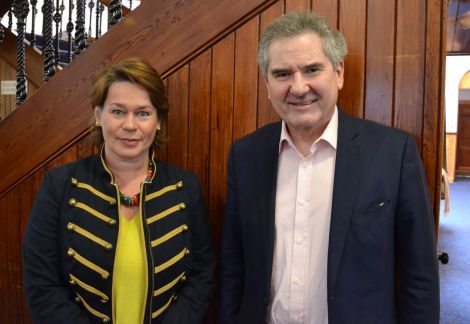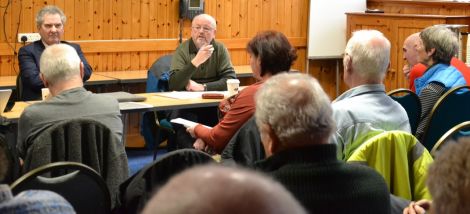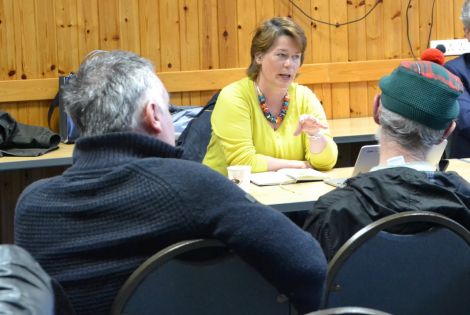Viewpoint / Referendum debate was uninformed & UK is unprepared for Brexit impact, argue SNP duo
TWO FORMER SNP MPs who have formed a consultancy to advise businesses about the potential impact of Brexit have warned that the UK Government is dangerously unprepared for the complexities of exiting the European Union.
Michelle Thomson and Roger Mullin took part in a debate organised by the local SNP branch at Islesburgh in Lerwick on Saturday morning where Yes Shetland activist and staunch Eurosceptic Brian Nugent argued that Scotland will be better off out of the EU.
Mullin, who lost his Kircaldy and Cowdenbeath seat in June, and Thomson – who did not stand in the 2017 General Election having been suspended by the SNP before a police investigation into her property business was dropped – formed Momentous Change last year.
The pair published a detailed interim report in November arguing that businesses need to adopt a more “nuanced” attitude towards EU withdrawal. They have spoken to hundreds of businesspeople across Scotland and say it is alarming that such critical research has not been conducted by the UK Government.
“Isn’t it shocking that this kind of work, on a more substantial scale with proper resources, is still not being done?” Mullin asked the 20 or so individuals who attended Saturday’s session.
He believes historians will look back on the 2016 EU referendum as “one of the most incompetent exercises ever carried out by a government”, with “absolutely no research done whatsoever by the UK Government”.
In contrast, he said, the 2014 Scottish independence referendum offered a clear choice between the status quo and the SNP’s white paper, published a year in advance.
Mullin pointed out that the UK would have to leave a host of European institutions simply because right wing Tories “do not want any jurisdiction for the European Court of Justice”.
That means leaving the things like the European atomic energy community Euratom, and standing by as the European Medicines Agency relocates from London to Amsterdam – taking hundreds of jobs with it.
Become a member of Shetland News
“How many people knew that’s what was going to happen?” Mullin asked. “There is a complete lack of any preparation for this.
“As a result people’s futures are being put at risk on a whim, and that… doesn’t strike me as good for democracy, let alone for future generations who are going to have to live with the consequences of this.”
He noted that major UK banks have done a lot of preparation and are looking at relocating aspects of their London business to cities including Frankfurt, Dublin and Paris, but are “saying absolutely nothing about how they’re going to react to Brexit in relation to their customers, to SMEs [small and medium enterprises] and the like”.
Mullin said Bank of England data showed net lending to small businesses by the UK’s main banks had “plummeted” since the referendum and those financial institutions “expect further and significant tightening” still to come.
Nugent stressed he was not going to defend the UK Government’s handling of Brexit. But he failed to see how five million people “on the periphery” of a European community of more than 700 million people are “going to get a good deal” in an institution that is “going to become the United States of Europe”.
He repeatedly referred to polls suggesting as many as one in three SNP voters had voted Leave, claiming that the lack of an official challenge to such statistics was tantamount to accepting it as gospel.
Nugent said that meant it would be foolish for SNP figures to be scathing towards those who voted in favour of Brexit, as they will need such people if they are ever to win a future Scottish independence referendum.
“In a year or two’s time possibly we’re going to have another referendum on coming out of the UK, and we’re suddenly expecting those SNP voters to flit back to loyalty when the SNP are spending a lot of time criticising the way that one third of those voters voted,” he said.
“I believe the SNP hitched the independence boat to something else – the EU – and it’s going to hurt us in the end.”
A host of other EU countries including Denmark and Ireland had rejected EU treaties in referenda only to end up “forced to have another referendum”, while Norway and Switzerland have both rejected membership twice, he told those present.
Thomson said she agreed with Nugent that the EU was far from perfect and “in some instances it can be agreed that actually the structures have enshrined neoliberal policies”.
But that was not a “good enough reason” to leave, and for every argument about “cutting red tape”, on the other side of the coin were fundamental things like human rights, access to paternity leave and EU citizens’ rights.
She said it was “difficult to exaggerate how dangerous I believe the agenda of the right wing Tory faction to be”. “This is their battle – a fight to the death of the UK Conservative party, of which we are now unwilling participants.”
Turning to the fishing industry, Thomson said the SNP understood “just what a cock-up the negotiation of the CFP [common fisheries policy] was at its inception, and the missed opportunities since then”.
But those negotiations had been conducted by the UK Government, and when she hears those within the fishing community saying they have been assured their protected area “won’t be traded away” because of a Tory commitment, “I can just allow myself to be cynical”.
“I understand and respect the concerns of many in the fishing community here,” Thomson said, “but there are dangerous waters ahead.”
Audience member and recently retired councillor Jonathan Wills asked why, if the CFP was such a disaster, the Shetland fleet are “more profitable and more successful than at any time” in hundreds of years?
Nugent responded that the fishing industry was employing far fewer people now as a result of the impact of CFP, while Mullin said he had been strongly critical of EU fisheries policy in the past – in the 1990s penning a two-page spread in a national newspaper arguing that the recently independent Namibia was managing its fishery much better.
“I’m not going to defend every dot and crossed ‘t’ of the CFP – there is a need for change, and there has been some change,” he said. “But it is true to say that it’s not just about catching fish, you’ve got to be able to sell fish, produce a quality that allows you to trade internationally, you need to be able to process the fish, you need the labour to do so.”
Former Highlands and Islands MSP Jean Urquhart said it had been unbearable watching Scottish fishing boats being broken up, but ultimately Westminster had decided that fishing was expendable in order to protect London’s financial sector and cause “the least damage to south east England”.
Thomson said there was a healthy debate differentiating between full EU membership and membership of the single market and currency union, but she is particularly fearful of the impact a no-deal Brexit and the introduction of World Trade Organisation (WTO) tariffs could have on businesses.
On that note, Mullin sounded a note of concern that “precious few business leaders we’ve talked to fully understand what the consequences are if we have to fall back on WTO rules”.
For instance, it would be “asking an awful lot” to deny Spanish fishing vessels access to fish stocks in UK waters and then expect to continue freely selling seafood produce to Spain.
“The 27 states in the EU, they are not going to want to negotiate a deal that gives, for example, the UK a better deal than countries like Norway,” Mullin said. “It just defies any logic to imagine they’re going to be able or willing to do that.
“The EU is not a centralised state, any deal has to be agreed by all 27 members. I can’t see the negotiations being anything like completed in the time they’ve left themselves.”
Nugent repeatedly stressed the importance of respecting democracy – leading the other panellists to point out that a majority in both Scotland (62 per cent) and Shetland (56 per cent) voted Remain.
That led Nugent to point out that more than four in five voters in the fishing community of Whalsay voted Leave, joking “I may move there”.
Irrespective of what exact proportion of SNP supporters voted Leave, Thomson said it was “reasonable to say there are some people in favour of independence who voted Leave”, but she also noted some unionists changing their stance and suggested there would be No voters who would plump for an independent Scotland within Europe rather than staying within the UK but out of Europe.
Another audience member, Isobel Mitchell, commended Mullin and Thomson for the work they’ve done since moving on from Westminster and trying to fill “the vacuum of information and data as we career towards this anarchic oblivion”.
“On the point of democracy, [almost] two thirds of all Scots voted to remain,” she said. “SNP policy and the voice of the membership and the votes counties was an enormous endorsement of a very proactive, pro-EU – but within a hopefully reformed EU – outlook for the future.”
In a show of hands, all but two people present were in favour of remaining in the EU – while Nugent said he was “even more convinced” of his position following the debate.
SNP Shetland branch convener Iain Malcolmson concluded an even-tempered, good-natured 90-minute discussion by saying it was clear to see “the sort of complexity of the debate that is going on”, adding: “You just wished that could have taken place before the vote and people could have made a more informed decision.”
Become a member of Shetland News
Shetland News is asking its many readers to consider paying for membership to get additional features and services: -
- Remove non-local ads;
- Bookmark posts to read later;
- Exclusive curated weekly newsletter;
- Hide membership messages;
- Comments open for discussion.
If you appreciate what we do and feel strongly about impartial local journalism, then please become a member of Shetland News by either making a single payment, or setting up a monthly, quarterly or yearly subscription.































































